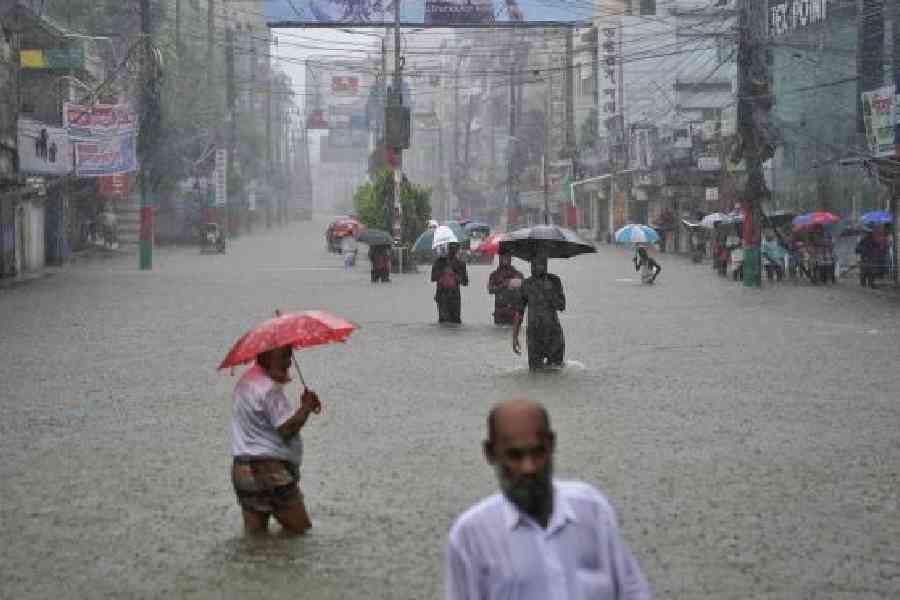India bashing reached new heights across Bangladesh on Thursday in the wake of floods that affected over three million people and killed at least three across eight districts after Nahid Islam, information and broadcasting adviser of the interim government, accused New Delhi of "inhumanity" by opening a dam without early warning.
The ministry of external affairs denied reports that the floods in the eastern districts of Bangladesh — Feni, Cumilla, Chittagong, Khagrachhari, Noakhali, Moulvibazar, Habiganj, and Brahmanbaria — were caused due to the opening of the Dumbur dam, located upstream of Gumti river, in Tripura. In a detailed statement, the MEA attributed the floods to waters from catchment areas downstream of the Dumbur dam, which had experienced incessant rainfall.
"We would like to point out that the catchment areas of the Gumti river that flows through India and Bangladesh have witnessed heaviest rains of this year over the last few days.... Rainfall has been continuing since 21 August in the whole of Tripura and adjoining districts of Bangladesh," said the statement.
It also added that the Indian authorities had communicated the rising water-level trends to Bangladesh up to 1500 hrs on August 21, 2024, but a power outage had disrupted this flow of information from 6 pm. "India had been communicating flood data to Bangladesh through other means,” the MEA said.
The official denial, however, did little to quell the taut nerves and there were reports of gheraos at all the five visa processing centres in Rajshahi, Chittagong, Khulna, Sylhet and Dhaka, which prompted the Indian High Commission to indefinitely close down these centres in view of the security situation.
"The visa processing centres had slowly begun clearing the backlog and issuing visas... In view of what happened today, the centres had to be closed," said a source.
The security concerns of Indian establishments in Bangladesh featured prominently in the discussion between Indian High Commissioner Pranay Verma and interim government chief Muhammad Yunus when the former met him this afternoon.
Shafiqul Alam, press secretary to the chief adviser of the interim government, told reporters about Verma's concerns before adding that security had been stepped up in the entire diplomatic area in Dhaka.
A source said that the decision on reopening the Indian visa centres would depend on assessment of the ground situation after a few days. The decision to close down the centres will affect hundreds and thousands of Bangladeshis, who have been waiting for the resumption of normal functioning of the visa centres. The arrival of Bangladeshis to India for various purposes, specially for medical reasons, came down drastically over the last 45 days due to the disruption in the functioning of the centres after unprecedented unrest in the country.
"I have been waiting for the Indian Visa Application Centres to resume normal services as I need to visit Calcutta for my father's surgery... Now it has become uncertain," said a college teacher in Dhaka, questioning the rationale behind the gheraos.
Multiple sources in Dhaka blamed Islam's "immature comments" for contributing to the anti-Indian sentiment, which has been on the rise since the fall of the Awami League government on August 5 following which Prime Minister Sheikh Hasina flew to India. Some political parties like the BNP have already begun demanding Hasina's extradition after questioning why India gave asylum to the deposed Prime Minister.
Against this backdrop, the comments of Islam, also a student leader and a key coordinator of the Anti-discrimination Student Movement that led the stir against Hasina, added to the anti-India rhetoric that began on Wednesday night after students began agitating at various places holding New Delhi responsible for the flood.
"India has shown inhumanity and non-cooperation by opening the dams without any advance warning... We will urge, and hope that India will refrain from this kind of policy against the people of Bangladesh soon. Students and people of Bangladesh are angry with this policy of India," Islam told reporters on Thursday.
Several prominent student leaders like Sarjis Alam and Hasnat Abdullah — who are calling the shots after the fall of the Hasina regime — spewed venom against India in social media, which added to the rage among the public.
The Right-wing Jamaat-e-Islami — known for its anti-India position for years — also joined the chorus. "India had created a situation to drown the people of the greater Comilla region of Bangladesh by opening this dam," it said in a statement.
A source in South Block said that such statements by some of the key constituents of the new regime will come in the way of developing a healthy bilateral relationship between the two countries.

